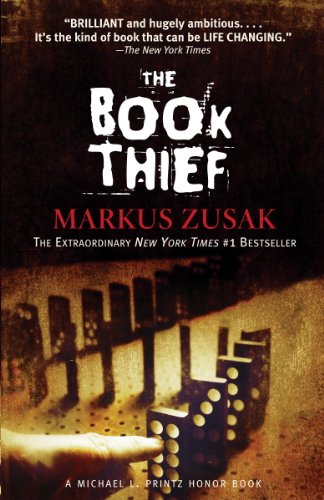All Nonfiction
- Bullying
- Books
- Academic
- Author Interviews
- Celebrity interviews
- College Articles
- College Essays
- Educator of the Year
- Heroes
- Interviews
- Memoir
- Personal Experience
- Sports
- Travel & Culture
All Opinions
- Bullying
- Current Events / Politics
- Discrimination
- Drugs / Alcohol / Smoking
- Entertainment / Celebrities
- Environment
- Love / Relationships
- Movies / Music / TV
- Pop Culture / Trends
- School / College
- Social Issues / Civics
- Spirituality / Religion
- Sports / Hobbies
All Hot Topics
- Bullying
- Community Service
- Environment
- Health
- Letters to the Editor
- Pride & Prejudice
- What Matters
- Back
Summer Guide
- Program Links
- Program Reviews
- Back
College Guide
- College Links
- College Reviews
- College Essays
- College Articles
- Back
The Book Thief by Markus Zusack
“It’s just a small story really, about among other things: a girl, some words, an accordionist, some fanatical Germans, a Jewish fist-fighter, and quite a lot of thievery.” –Death
Death. As human beings, we fear death. We see death as a horribly sad, although inevitable thing. We don’t consider death as anything but a natural, awful part of life. However, in The Book Thief, we see death as something completely different. In The Book Thief, we see Death, not death. Death is our narrator, he sees and he grasps all the events in the lives of the humans he observes. Death is wise and kind, however underappreciated. He has a difficult job, but he does it well. This doesn’t mean he doesn’t feel empathy, he has a heart. Death is careful with the souls he collects, he carries them with care, and he is considerate. Death is good; we just don’t like what he does.
Death sees the life of Liesel Meminger unfold before his very eyes. When Liesel is at her brother’s funeral and she steals a book out of the snow, The Gravedigger’s Handbook, he is there to explain it to us. He sees when the fostered girl enters the home of Hans and Rosa Hubermann in Nazi Germany. Hans teaches Liesel how to read and plays his accordion for her; Death tells us exactly how the music flowing from the accordion to Liesel’s ears sounds. When Liesel meets her new best friend, Rudy Steiner, Death describes him as the boy with the hair the color of lemons. He described their wonderful and unique friendship to us. He explains how things can be both wonderful and terrible, their experiences both excellent and tragic. Death is the one to let us know that Liesel’s family is a minority in Germany during World War II; they are part of the 10% of people that don’t support Hitler. Consequently, they want to help people affected by his immense power. We are able to see and experience, thanks to Death’s words, the arrival of Max Vanderburg into the home and the heart of Liesel Meminger. Death articulates the relationship these two have, the young German girl and the Jewish fist fighter. Max continues to teach Liesel how to read and how to write, and he even gives her a present. In the pages of Mein Kampf or “My Struggle,” Hitler’s autobiography, Max made stories for Liesel. The first was called The Words Shaker and the second was called The Standover Man. Both stories were about Max and Liesel and both exemplified the friendship that these two shared. When Liesel begins to read more and more her desire for books grows larger and larger. She starts stealing books wherever she can, one by one. Death witnesses this and Death understands this. Death passes the knowledge of the events of Liesel’s life to us; every person she meets, every book she takes, Death knows and Death tells the story.
This book, reading this book is one of the most emotionally draining things that I have ever experienced. This book made me burst into laughter and burst into tears. This book made me immensely happy and extremely sad. Every single person should read Death’s words; every single person should know the things that Markus Zusack wrote. This book changed my life, and I feel very strongly that it has the potential to change anyone’s life, if they truly get to know the characters. This book changed my perspective on many things, especially Death. I was forced to look through Death’s eyes and see things the way he sees them. Markus Zusack opened my eyes up to a wider world with this uniquely and beautifully written story. I can without a single doubt in my mind that this is the greatest book I have ever read, and I hope other people will read it and experience it, too.
Similar Articles
JOIN THE DISCUSSION
This article has 0 comments.

